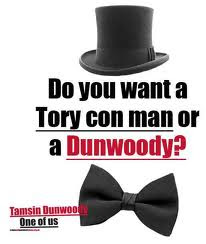The problem with clichéd expressions is that they become so threadbare that they lose all their effectiveness, so it’s great to see one spectacularly vindicated.
In April 2008, Gwynneth Dunwoody died. She was a veteran Labour Party Member of Parliament, with a reputation as a battleaxe, not afraid to speak out in favour of individuals and causes needing support, however unpopular they might be.
At the by-election for her Crewe and Nantwich seat, Gwynneth’s daughter Tamsin carried the banner for Labour. Now, I’m not terribly keen on dynastic arrangements in politics. After all, we only have to look at Prince Charles to see that the hereditary principle doesn’t work terribly well. And the US provides a powerful counter-example: where George Bush senior is in the running to figure among the ten least impressive presidents, his son Dubya has an excellent chance of winning the coveted title of all-time worst.
In this country, it’s usually the Conservatives who go in for this kind of thing. Joseph Chamberlain won something of a reputation as a campaigning politician; his son Neville signed the Munich agreement with Hitler. Winston Churchill’s grandson of the same name had a parliamentary career of well-deserved obscurity.
Still, there have been Labour examples of political families too, and Tamsin Dunwoody clearly wanted to be part of another. Unfortunately, she decided to run a campaign based on denunciation of the ‘toffs’ in the Conservative Party, of politicians banking on their inherited privileges. Unfortunately, building a campaign on a rejection of inherited power is perhaps not the smartest thing to do when you want to take over from your mother.
 |
| A misguided campaign? |
Curiously, now that we’re living under a government run by those toffs, it’s becoming clear that if Labour feels it shouldn’t sink so low as to engage in class war, that’s not a view shared by its opponents. The war hasn’t ended, it’s just become one-sided. The government has cut tax rates for the 1% of top earners while savaging benefits to the poorest: the unemployed, the disabled, the working poor who have seen tax credits withdrawn and support for their children's education abolished. Food banks are proliferating throughout the country.
Many of the senior politicians responsible are also tainted by their association with figures who left much to be desired, and not merely for being rich but for actions that may have involved malpractice or downright offences. The Prime Minister himself is the most prominent among a group that includes the Mayor of London and several ministers who were a lot too close to Murdoch corporation executives and bankers now under investigation for highly dubious activities.
These are serious and well-founded allegations against the government. What’s most striking today, however, is that charges are also beginning to rain down on it based on no more than the appearance of impropriety.
Last week the Conservative Chief Whip Andrew Mitchell felt he had no choice but to resign, in the face of the sustained opposition to him in his own party. His offence? In a burst of temper, and according to the officers involved, he called some police ‘plebs’. Can any of us say we have never in our lives sworn at a policeman, if only under our breaths? It’s hardly a resigning offence, but that word ‘plebs’ hanged him: the Tories are now seen as so entrenched in privilege that many believe that, despite his denials, he used the term out of his inbuilt belief as an Etonian in his superiority over ordinary mortals.
And then on Friday, the Chancellor of the Exchequer, George Osborne, was spotted travelling in first class on a train despite having a second class ticket (‘standard class’ as it’s euphemistically called). He apparently paid the upgrade but nonetheless there’s a widespread presumption that he was trying to get an unfair advantage, to cheat the regulations because he doesn’t believe they apply to him as they do to others.
In other words, Tamsin Dunwoody’s accusations are believed these days not only when they are incontrovertibly true, but even when there’s the slightest appearance that they might be. What went round at her Nantwich and Crewe by-election in 2008, is coming back round now with a vengeance.
My congratulations to her for her prescience, though it did her no good then and it’s far too late for her to profit by it now.
But let us also admire the government for mismanaging its public relations to the point where an increasing proportion of the electorate is unprepared to give it the benefit of any doubt, instead preferring to believe the worst of it as soon as anything even slightly discreditable happens, however flimsy the evidence.
Labour must be beginning to feel growing confidence over the General Election of 2015. I wonder whether it might even take back Crewe and Nantwich?
No comments:
Post a Comment